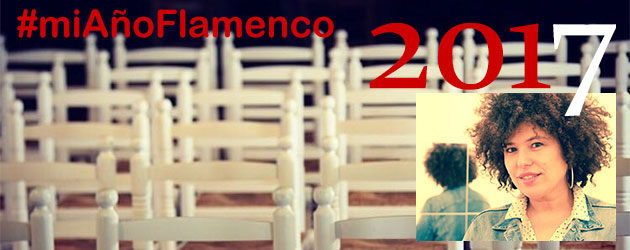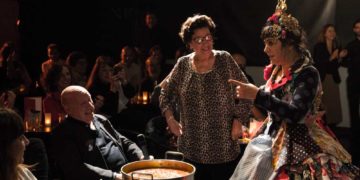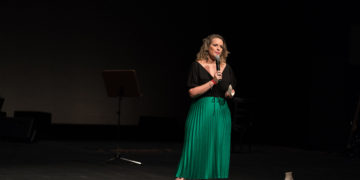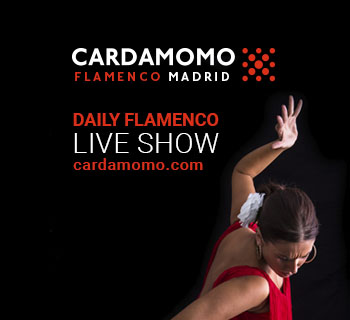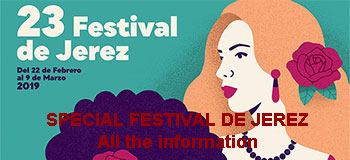Silvia Cruz Lapeña
From Rocío Molina's tanga, to the discovery of Juan Habichuela's grandson, and the metamorphosis of Rocío Márquez, 2017 was a flamenco year full of stripping down and revelations.

My flamenco year began with the image lodged in my eyes of a white dress. Rocío Molina wore it on the stage of the Nimes theater, and by how it moved and how she moved it, it seemed like a work signed by Frank O. Gehry. It was hypnotic, but it was destined to last only a short time on the Malaga dancer’s skin, because it was a mere costume that was cast aside leaving her naked, to then put on a tanga and continue dancing. It was the first nudity of the year, that of Caída del Cielo, a work that one day will be studied in universities and dance schools throughout the entire world.
That was the first, but not the only striptease I saw in 2017, a year full of nudity and flamenco revelations. One of them came from Antonia Contreras in an interview we did. It happened when, after a long silence that I know is not a pose, she confessed something so ordinary that many people still think it’s normal: that artistically she was a late bloomer because she did not have the support of her mate, and for having been a mother. For this reason her goal was difficult to achieve. So much so, that she herself though she’d lost every chance to forge a career. But such was not the case, I’m happy for that, and this year, having won the Lámpara Minera in La Unión at the age of 53, she made her first recording: La Voz Vivida.
Another kind of nudity was set out before my eyes by Juan Manuel Cañizares, a discreet man, nearly hidden by the work he does so well and with such a high level, that what he does, doesn’t even seem hard. Never would I have imagined there was a person of such great integrity behind those fingers. I was surprised by his vision of life, his mild-mannered way of being, his vital learning process and his vision of music, his fellow artists and books as well. Cañizares is a musician who reads, it’s not that common despite the fact that every art-form draws from all the rest, or so it ought to be. His conversation was a discovery, the nudity, not so much of a musician as of a man, one who is complete and complex and who dignifies the music he plays, whether classical or flamenco.
Newcomers
Among discoveries that came out of nowhere, there was Aurora. It was doubly interesting, since they’re from Barcelona, arriving at a difficult moment, and their offering is rock with psychedelic touches, jazz, popular songs… following the thread of Manuel de Falla. Aurora is five young men who have no fear of getting near Dante’s inferno in such a special way. As far as I’m concerned, I have no doubts that there is no song or style or author or dream that can’t be combined with flamenco. You just have to do it in time, with taste and tact. Pere Martínez, the voice, is no discovery, I’ve been listening to him and following him for a long time, but you could say this year he’s let loose, and made all the material left to him as his own. And that, just in case anyone was wondering, is another way of peeling away the layers and being naked.
Rocío Márquez knows well that she’s no newcomer, but this year it looks that way because of her bravery and freshness. She’s following her classic inspiration, but broadening it because she is artistically restless and needs this, and because something has happened to her that happens to every living being that grows: she no longer needs anyone’s approval to move forward. That’s why she created Firmamento, and had no qualms about leaving our ears wide open, expectant and with the desire to know more about that universe in which she left behind the bulerías dance to show herself as she really is, a woman with a voice and a conscience.
Because we’re all born naked, but only our bodies. In our heads, skin and heart, teaching, advice and rules are recorded. Some are guides, but others are brakes, and it’s a beautiful thing to be grateful but not subject. The thing is, in order to remove the clothing given to us by the family, and choose your own, you have to be brave. One person who seems to have understood this before turning 30 is Juan Habichuela’s grandson, whom I saw at the Festival Flamenco on Fire in Pamplona, and I can’t get it out of my head. I hear him now on a record, and I want to point out the mistakes, which are there, but I realize he’s not wearing any borrowed clothing; it’s as if he were playing, despite his artistic name, free from the family, its history and its weight.
No veils
Once in a while, there’s only a thin veil separating what there is from what you see. Mine fell away in Vienna where Israel Galván debuted La Fiesta. It was a hard drink to swallow, makes no sense to say otherwise, but not so much due to the work itself, but because Israel, an expert weight-lifter, was unable to lift up the show at any point. I just went back to the notes I took that night, to the interview with Pedro G. Romero, to things nearly 30 people said at the end of the show, and I’m still unable to share the way they forgive Israel, the author of the work, something I also did in the past with works of his. I confess to being a bad mother: I’m harder on the one who is capable of doing more, and Israel can do anything. But I’m also a good lover; I continue to wait for his work like someone crossing the desert in search of water. But now without that veil.
The other veil that fell away, now threadbare and worn, is the one of believing we’re all equal. The Reina Gitana in Jerez told me her story: that of a person who had known discrimination for being a woman who played piano, not for being a gypsy. Rocío Márquez also expressed this experience, and describing all the flak they took for their words, published by me, I finally understood that if that wound burns so much, it’s because it isn’t healed yet. I went through the same thing with Fernando López, whom I interviewed regarding his book on homosexuality in flamenco. It raised a lot of ruckus about something that is neither new nor controversial, just more visible. But we live in a country obsessed with hushing things up, as if silence had dug up the sides of roads where people are still buried, or saved any woman from being killed by the same person who claims to love her.
Other striptease acts
In 2017 there were other eloquent stripteases. Take a look at Melchora Ortega transformed into Lola Flores. Discover in David Coria a sort of Gene Kelly who seduced my eyes. Or the voice of Paco del Pozo, speaking to me from the heart about becoming a father, or the bad spell from which he emerged so much stronger. Another moment was the time spent at the Peña Luis de la Pica in Jerez where it’s a sin to look at your watch, and I discovered that if I set my mind to it, I can get pulled along by the present. Or the concert Dani de Morón gave in May at the Auditori de Barcelona, and which left my hometown covered in Morón whitewash and light.
This year I also had my own striptease. One of the things I discovered is that I can’t stand three-hour concerts, nor artists who arrive late to interviews, or change the day and the time. I also learned that writing a book is an act of exposure a hundred times bigger than publishing articles, and that there is no greater nudity than choosing the words with which to explain my things, those of other people and of the world. But that’s all the analysis I can offer of Crónica Jonda, which is no longer mine, just as the works, concerts and records cease to belong to their creators, and belong to the general public who take them apart piece by piece (or strip them down) to their own liking and desire to make them their own.



